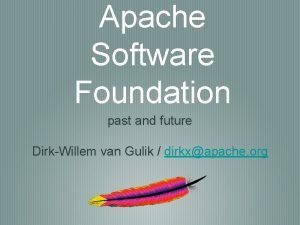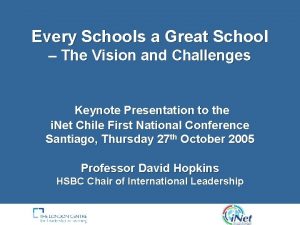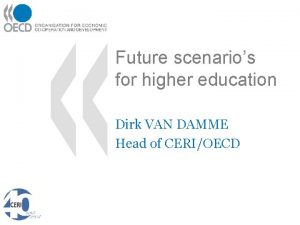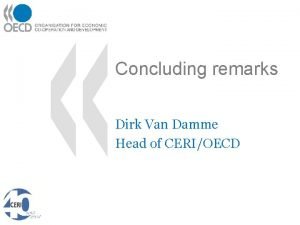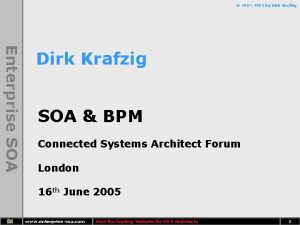Future scenarios for higher education Dirk VAN DAMME











- Slides: 11

Future scenario’s for higher education Dirk VAN DAMME Head of CERI/OECD

Scenario’s • Coming out of the OECD/CERI project on ‘University Futures’ • Not predictions, but consistent descriptions of alternative hypothetical futures • To help decision-makers and stakeholders to make strategic choices – Tools for futures thinking and strategic management – Drawing up imagination and creative thinking 9 December 2008 OECD/CERI/France conference 2

Sc 1. OPEN NETWORKING • International collaboration and networking among institutions, scholars, students and with other actors such as industry • Harmonization of HE systems • High mobility of students designing their own courses and trajectories, modularization, technologically supported teaching and learning arrangements • English as lingua franca • Free and open knowledge exchange, international collaborative research and, although there still is hierarchy in institutions, open access to research 9 December 2008 OECD/CERI/France conference 3

Sc 1. OPEN NETWORKING • Related developments: – Bologna Process in Europe and other examples of regional convergence, mobility – International academic partnerships and consortia – Cheap and fast communication by the Internet – Open access to knowledge 9 December 2008 OECD/CERI/France conference 4

Sc 2. SERVING LOCAL COMMUNITIES • Institutions focused on national, regional and local missions • Educational an research activities tuned to the needs of local communities, although small number of internationally active institutions • Funding secures by local governments and business • Close relations to local industry for design of initial training and lifelong learning • Research activities less prominent (eventually concentrated elsewhere), but teaching and learning seen as important (esp. in humanities and social sciences) 9 December 2008 OECD/CERI/France conference 5

Sc 2. SERVING LOCAL COMMUNITIES • Related developments: – Scepticism regarding globalisation, even antiglobalisation movements – Emergence of geo-strategic concerns and even protectionisms – New interest in regional functions of higher education – Interest in role of higher education in preserving national culture and fostering social cohesion 9 December 2008 OECD/CERI/France conference 6

Sc 3. NEW PUBLIC RESPONSIBILITY • Higher education publicly funded and regulated, but with greater use of ‘new public management’ tools: institutional autonomy, market forces, deregulation, financial incentives, etc. • Increasing private resources, from tuition fees, patenting and industry relations • Strong public accountability systems, but also more private reward systems (reputation, feedback from families and students) • Diversification of institutions • String competition for public research funding 9 December 2008 OECD/CERI/France conference 7

Sc 3. NEW PUBLIC RESPONSIBILITY • Related developments: – Accountability, transparency, efficiency and effectiveness, responsiveness and forward vision as cornerstones of public management – Increasing institutional autonomy and growing private resources – Cost-sharing and raising tuition fees in many OECDcountries under debate to escape financial constraints of state budgets – Competitive research funding schemes 9 December 2008 OECD/CERI/France conference 8

Sc 4. HIGHER EDUCATION INC. • Higher education institutions competing globally to provide education services and research services on a commercial basis • Research and teaching disconnected and institutions specialise their mission according to demand • High competition for students; trade in commercial knowledge, research and education (incl vocational) • International competition and specialization; outsourcing of research and education, also with emerging economies; concentration of top-research • English as language of research and postgraduate studies 9 December 2008 OECD/CERI/France conference 9

Sc 4. HIGHER EDUCATION INC. • Related developments: – Trade liberalization in education; opening up educational services to global market; GATS – International market of research – Rise of private higher education and private funding in public systems – Increasing international mobility of students and cross-border higher education 9 December 2008 OECD/CERI/France conference 10

global/international Higher Education Inc. Open Networking New Public Responsibility state Serving Local Communities local/national market





